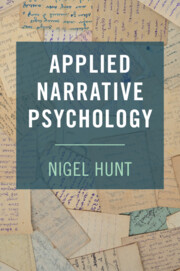Book contents
- Applied Narrative Psychology
- Applied Narrative Psychology
- Copyright page
- Contents
- Preface
- Chapter 1 Introduction
- Chapter 2 What Is Narrative?
- Chapter 3 Narratives in Psychology
- Chapter 4 Master Narratives
- Chapter 5 Narrative Methods
- Chapter 6 Life Interviews
- Chapter 7 Narrative Writing
- Chapter 8 Narrative Therapy
- Chapter 9 Narrative Exposure Therapy
- Chapter 10 Narrative Medicine
- Chapter 11 Narrative Health Psychology
- Chapter 12 Narrative Work Psychology
- Chapter 13 Narrative Coaching
- Chapter 14 Conclusion
- References
- Index
Chapter 14 - Conclusion
Published online by Cambridge University Press: 02 November 2023
- Applied Narrative Psychology
- Applied Narrative Psychology
- Copyright page
- Contents
- Preface
- Chapter 1 Introduction
- Chapter 2 What Is Narrative?
- Chapter 3 Narratives in Psychology
- Chapter 4 Master Narratives
- Chapter 5 Narrative Methods
- Chapter 6 Life Interviews
- Chapter 7 Narrative Writing
- Chapter 8 Narrative Therapy
- Chapter 9 Narrative Exposure Therapy
- Chapter 10 Narrative Medicine
- Chapter 11 Narrative Health Psychology
- Chapter 12 Narrative Work Psychology
- Chapter 13 Narrative Coaching
- Chapter 14 Conclusion
- References
- Index
Summary
This final chapter explores some of the key issues arising from the book. Perhaps the most important is that if we are going to apply narrative psychology, then we need a good body of evidence that it works. Narrative needs to be at the heart of mainstream psychology, but in order to be in this position, we need a lot more evidence regarding its efficacy. We have good evidence that narrative exposure therapy works, and that writing can help relieve stress. These provide evidence for the fundamental idea that narrative generally is effective, but we need to develop the evidence regarding areas such as narrative therapy and narrative coaching, where there is very little good evidence. There also needs to be a recognition that a lot of what psychologists do now is narrative psychology under another name. Storymaking and storytelling are such natural processes that we can take them for granted, but, for instance, most forms of psychotherapy are about changing one story for another. Occupational psychology is similar, one story about work needs to be exchanged for a better one. Psychology as a science needs to be more explicit about its use of narrative across many situations.
- Type
- Chapter
- Information
- Applied Narrative Psychology , pp. 164 - 169Publisher: Cambridge University PressPrint publication year: 2023

